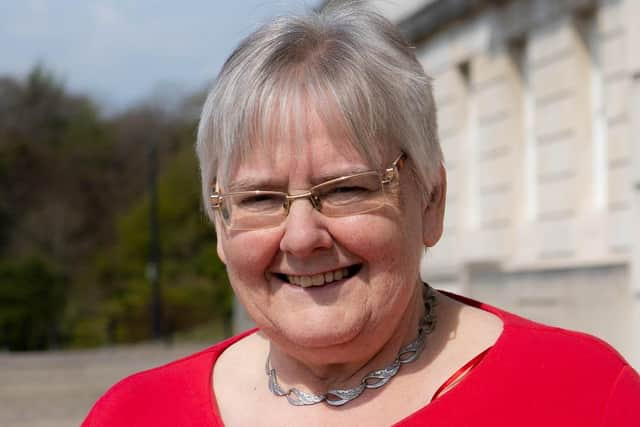New Export Health Certificate ‘practically impossible’ and not ‘feasible for Northern Ireland vendors’
and live on Freeview channel 276
TUV councillor, and South Down candidate for next year’s Assembly Elections, Harold McKee, has raised concerns about the conditions that apply to the movement of Northern Ireland livestock to and from the mainland.
The Mournes councillor is questioning the outworkings of the EHC, which has been proposed by the European Commission and approved by DAERA Minister, Edwin Poots.
Advertisement
Advertisement
The new certificate permits, “subject to certain conditions”, the return to Northern Ireland of cattle, sheep and goats, which originate in NI and are moved to Great Britain for an approved show or sale.


To use the EHC the following is required:
- Show or sale must be approved and operate in accordance with EU Export Assembly Rules (APHA approval guidelines).
- Segregation of NI animals must be maintained throughout the show/sale and comply with all relevant requirements for entry into the Union. TB testing for cattle and Brucella ovis testing for uncastrated male sheep is to be conducted in NI, as part of the requirements for the export health certificate to GB before movement to the show/sale in GB.
- Cattle, sheep or goats are moved directly from the establishment of origin in NI to the approved establishment in GB.
Advertisement
Advertisement


- Cattle, sheep or goats have no contact with animals of a lower health status from the loading for dispatch to GB, for the duration of the event until loading for dispatch to NI, and transport to their premises of destination in NI.
“As a former secretary for the Northern Ireland Blue Cattle Club (NIBCC) for four years, and as a Northern Ireland representative at the British Blue Cattle Society UK for a further four years, I was at the forefront of export/import certificates for cattle movements,” Cllr McKee explained.
“In my time as secretary of the NIBCC, we introduced the EHCs for farmers purchasing pedigree cattle in Northern Ireland to be transported to the Republic of Ireland.
“This had a positive reaction, as cattle could be bought and exported to a non-UK country on the same day.”
Advertisement
Advertisement
In his response to a written question tabled by DUP MLA Deborah Erskine, the Agriculture Minister said the new arrangements were the result of “extensive technical discussions” between Department of Environment, Agriculture and Rural Affairs officials, the UK government and the European Commission.
However, Cllr McKee has stated he is “not so sure” if any discussions were held with the animal breeding community itself.
He continued: “The introduction of the border in the Irish Sea in January 2021, has created an absolute barrier to animal movement between GB/NI.
“While continuing to operate the Protocol and man the ‘Poots Posts’ with his departmental staff, Minister Poots says he realises the unworkable practicalities and costs to purchasing livestock in GB.
Advertisement
Advertisement
“To buy cattle or sheep in GB, the new owner would have to seek accommodation, isolation and pay someone to feed their stock for six months, before being allowed to bring the animals home to NI - one of the four nations of the United Kingdom.
“As one who used to breed pedigree cattle, I have a fair grasp of what is expected before entering a prestigious sale, held under the auspices of a cattle society.
“Before entering cattle for these sales, they must be double tagged, with nose ring (in the case of a bull over one year) and halter led.
“Animals must conform to minimum height, weight, correct jaws and teeth etc.
Advertisement
Advertisement
“All sale animals must be blood tested for Tuberculosis (TB) and Johnes Disease and be vaccinated against Bovine Viral Disease (BVD).
“An animal treated for a skin disease 14 days prior to a sale must be accompanied with a veterinary certificate.
“Vendors must provide all veterinary approved health certificates and Herd Health Declaration form.
“These animals, most likely, will be coming off Quality Assured farms.
Advertisement
Advertisement
“Therefore, why should these NI cattle be treated as inferior to GB cattle when they both meet the UK pedigree standard criteria?”
Cllr McKee added that, despite the DAERA Minister saying the new EHC will “significantly reduce the difficulties” local pedigree breeders face when selling livestock in Britain, he is “not so sure if the technical discussion team had any discussions with the animal breeding community”.
“I am concerned about the phrase, ‘but certain conditions apply’,” he added.
“These conditions could mean separation between NI and GB animals and, indeed, between animals of a lower health status on the same transport vehicle.
Advertisement
Advertisement
“There could be separate holding pens, separate washing bays, separate veterinary inspectors, separate inspection crush, separate show rings and separate sale rings, to cite just some examples.
“Will there be an isolation period for animals which may have been rejected as a result of their breed criteria inspection if they return home?” Cllr McKee questioned.
“Surely it would be impossible for a judge to judge cattle which aren’t allowed to be together in the same age category.
“Furthermore, how can a buyer view and purchase an animal from separate sale rings?
Advertisement
Advertisement
“Personally I believe this EHC is practically impossible and won’t be feasible for the Northern Ireland vendor, yet it is another strand of the Protocol that the DUP DAERA Minister sees as acceptable, due to the fact that he continues to operate it,” he ended.
Meanwhile, Fermanagh and South Tyrone MLA, Rosemary Barton, has welcomed the new export arrangements.
Mrs Barton, who is a member of the assembly’s Agriculture, Environment and Rural Affairs Committee, said it is something she has been lobbying for since the introduction of the Protocol.
“As part of the United Kingdom, our agricultural producers must still have fair access to the British market, without the threat that unsold animals would incur residency requirements in GB,” the UUP assembly member commented.
Advertisement
Advertisement
“The prospect of it not being possible to return animals to NI, if unsold at a sale in GB, stifled the business plans of many pedigree breeders who depended on the GB market for the sale of their produce.”
However, while Mrs Barton has welcomed news of a new EHC, she has highlighted a “major concern” which needs addressed.
“While this rule change is very welcome news, even though there are certain conditions such as NI animals being kept separate from GB animals while at the sales/shows, there still remains a major concern [in relation to] animals purchased at sales in GB.
“These animals cannot be imported into NI immediately, so, therefore, I would urge this issue now be given prompt attention,” Mrs Barton concluded.